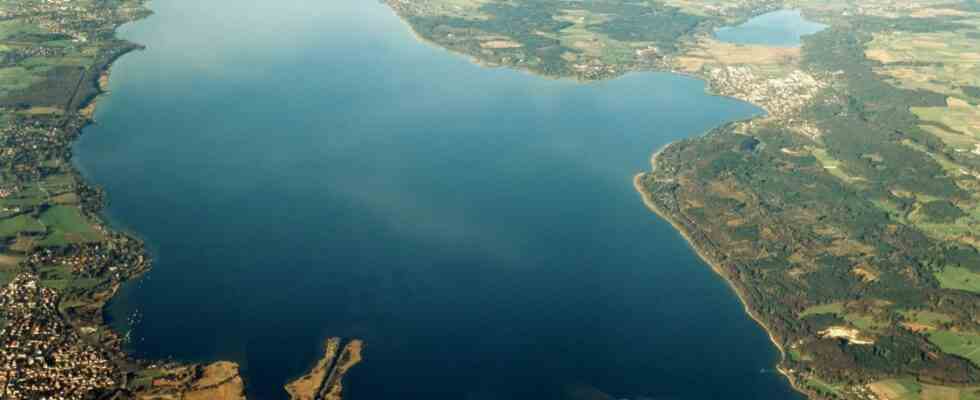Rainer Maria Rilke’s autumn poem begins, almost like a prayer, with the line “Lord: it’s time. The summer was very big.” Rilke wrote that in 1902. In 2022 you have to paraphrase it: “The summer was very dry.” The drought, which has lasted since 2018, reached a peak in 2022. That summer was miserably dry; less water than this year was rare. According to the scientists, we are experiencing the worst drought in Europe for 250 years. The Rhine and Danube, the great rivers, have become weak, many rivers are rivulets.
The drought stress makes the trees susceptible to the bark beetle and the tree fungus. The spruce is miserable, the beech miserable; only a fifth of the trees in the forest still have a healthy crown. Viewed from above, many forests are no longer green, but red-brown in summer. And the ears of corn in the fields? They have a lot of shell and little core. The corn withers on the stalk, the hops bleat. Crop prices will rise sharply. In many fields, the potatoes are so small that they fall through the sieve chain when harvested. Thanksgiving? The festival is canceled this year.
The soil has become so hard that when it rains, it can hardly absorb the water; this leads to flooding. The inner peace of nature is, you can see and feel it, severely disturbed. Almost forty years ago, the post office issued a special stamp that said “Save the forest”. The clock on the stamp read four to twelve. Behind it one saw a pathetic wood; a few conifers, in between withered tree skeletons: the forest is dying!
Trees are a brake against global warming
It was one of the most pressing environmental issues at the time. Politicians reacted with drastic laws to keep the air clean and against acid rain. In 2003, the Federal Minister of Agriculture, Renate Künast, was able to announce the end of the forest dieback. It has started again; this time not because of the acid, but because of the lack of rain.
Trees are a brake against global warming; they bind CO₂ and reduce the greenhouse effect. But the brakes no longer work well. We are experiencing forest dieback 2.0. You can reissue the old special stamps and print many new ones with many new motifs: save the forests! Save the water! Water is life – also in the forest! Save the deer! Save the rivers! ! Save the climate!
Water is the most important essence in the world. But: “The invention of the faucet and the mineral water bottle made us forget that the water before it flows out of the faucet or is sold in bottles is a gift from nature,” says Indian environmentalist Vandana Shiva. The way many people and societies deal with this gift deserves the description “gross ingratitude”. That’s what you can call it when millions of liters of the best drinking water are used in the countries of the rich world to flush away the faeces in the toilets. Rainwater could be used for two thirds of the water consumed in the household.
Nature revokes her gift
Gross ingratitude: That’s how the lawyers describe it when the recipient, in this case it’s the human being, is guilty of serious misconduct towards the giver, i.e. nature. According to the legal rules, the donor can then revoke the donation. Nature as the giver is about to do this; on and in the Oder one has only just been able to observe this.
The donor has a right of withdrawal, especially if the recipient abuses the donor. Nature’s abuses are not just in the past; they are in the present. The pollution of the environment has still not stopped, nor has global warming; the higher temperatures at the bottom cause even more water to evaporate. And the sealing of the land is progressing. In Bavaria alone, an area the size of Lake Ammer disappears under concrete every year. Meadows and farmland are being eaten up by more and more commercial areas and new housing estates – ten hectares a day in Bavaria. The law actually stipulates that compensation areas must be created, such as meadow orchards. This law is hardly observed; and there will soon be no more compensation areas. The scavenger hunt has to stop.
It is good when rainwater is collected in cities, when ponds are built in residential areas, when seepage troughs feed the cities’ groundwater. The experts call this “sponge city projects”. The groundwater level should not fall any further. It is also good when drained moors on the land are re-wetted and when the streams and rivers are renatured. It is good if the service water from the apartments is treated and recycled. It is good when there is a return to the value of water. Water is life.
“If you’re not happy anymore, throw yourself into H₂O.”
I grew up in a town in the Upper Palatinate, on a beautiful river called Regen. My high school was on the outskirts of the town, on the high bank of the river. The chemistry teacher there had the saying on particularly hot days: “If you’re no longer happy with life, throw yourself into H₂O”. The condition of the water and how it is handled does not make you happy. It’s time for an SOS.
In recent months, Germany has complained a lot about the lack of gas and has been looking wildly for alternatives to gas. That was and is certainly necessary. But: gas is a replaceable resource; water not. A lack of water has a much greater impact on the entire ecosystem than a lack of gas. Water is the most elementary raw material. Securing and protecting it requires the most elementary efforts. It’s time. The summer was very dry.

